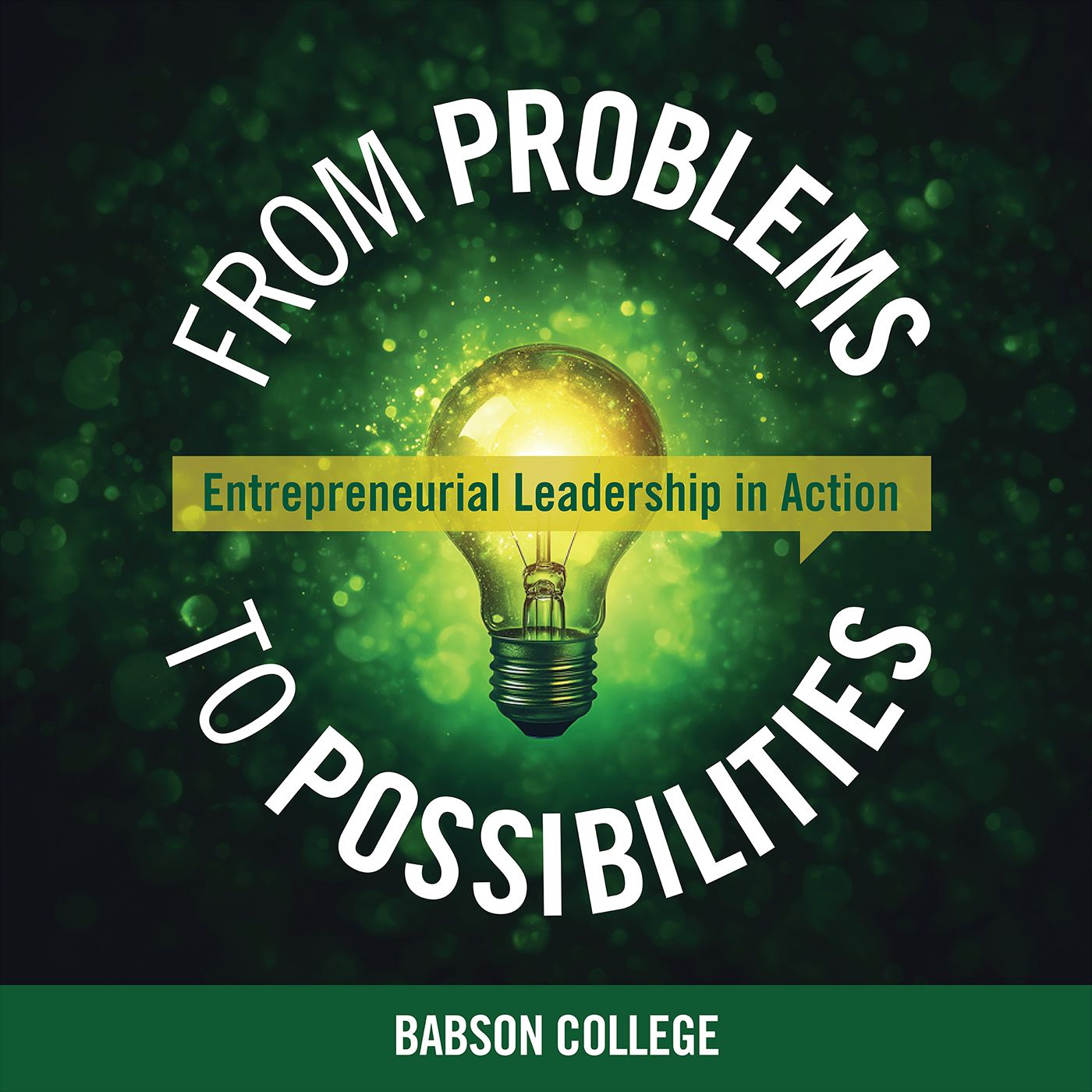Listen "Do Well by Doing Good"
Episode Synopsis
If you live in the U.S., chances are you have a lot of stuff. Or at least you want to have a lot of stuff. As the MIT Press Reader notes in their brief history of consumer culture 'consumption is now frequently seen as our principal role in the world.'
We've been trained in a way to want more stuff, and that stuff takes a lot of resources to make, to ship, and then at the end of its life, to dispose of. And as sustainability becomes an increasingly important conversation for our collective future, how are brands looking at these problems? How do we account for all this waste and energy that we're consuming?
Can a company make consumer goods like clothes and electronics more sustainable without sacrificing their bottom line?
Today, we're tackling just about the biggest entrepreneurial problem there is in consumer goods - Sustainability.
We'll hear from two Babson College alumni and entrepreneurial leaders who are at the forefront of reimagining processes and their businesses and pointing us to a more sustainable future. And perhaps also a more thoughtful approach to consumerism.
And we'll speak with a renowned Babson accounting scholar who will help us understand how integrating sustainability practices into your balance sheet can not only create tangible value, but intangible value for your brand as well.
Uddhav Bagrodia ‘21, Co-Founder and President of Wastewear
Brigitte Wudernitz Muehlmann, PhD., MST, Professor in the Division of Accounting and Law at Babson College
Samuel D. Herec MBA ‘25, VP of Product and Sustainability at TIvoli Audio
Sources:
Intro Segment:
Higgs, K. (2021, January 11). A Brief History of Consumer Culture. The MIT
Press Reader. Retrieved April 2, 2025, from
https://thereader.mitpress.mit.edu/a-brief-history-of-consumer-culture/
Uddhav’s Segment:
https://www.wastewear.com/
Ruiz, A. (2024, March 18). 47 Official Sustainable Fashion Statistics.
TheRoundup.org. Retrieved April 2, 2025, from
https://theroundup.org/sustainable-fashion-statistics/
2. Yorke, S. (2024, November 12). What is Sustainable Fashion? Oxfam.org.
Retrieved April 2, 2025, from
https://www.oxfam.org.uk/oxfam-in-action/oxfam-blog/7-facts-about-sustai
nable-fashion/
(2025, March 30). Environmental Sustainability in the Fashion Industry.
GenevaEnvironmentNetwork.org. Retrieved April 9, 2025, from
https://www.genevaenvironmentnetwork.org/resources/updates/sustainabl
e-fashion/
Circle Economy (n.d.). The Circularity Gap Report - Textiles.
Circularity-Gap.World. https://www.circularity-gap.world/textiles
5. California State Legislature (2024, September 30). SB-707 Responsible
Textile Recovery Act of 2024. California Legislative Information. Retrieved
April 24, 2025, from
https://leginfo.legislature.ca.gov/faces/billNavClient.xhtml?bill_id=2023202
40SB707#:~:text=This%20bill%20would%20enact%20a,producer%20resp
onsibility%20organization%20or%20PRO.
Professor Muelhmann’s Segment:
The five entrepreneurial practices are from the book “Teaching Entrepreneurship: A
Practice-Based Approach” by Heidi Neck, Candy Brush and Patty Greene.
https://www.amazon.com/Teaching-Entrepreneurship-Practice-Based-Heidi-Neck/dp/178
2540695
Sam’s Segment:
https://tivoliaudio.com/
Evers, J. (2025, April 23). The Great Pacific Garbage Patch.
NationalGeographic.org. Retrieved April 25, 2025, from
https://education.nationalgeographic.org/resource/great-pacific-garbage-patch/
Credits:
Paul DeWolf, Executive Producer
Madeline Poirier, Writer, Producer, and Host
Billy Wirasnik, Audio Recording, Design, and Mix
Epidemic Sound, Music and SFX
We've been trained in a way to want more stuff, and that stuff takes a lot of resources to make, to ship, and then at the end of its life, to dispose of. And as sustainability becomes an increasingly important conversation for our collective future, how are brands looking at these problems? How do we account for all this waste and energy that we're consuming?
Can a company make consumer goods like clothes and electronics more sustainable without sacrificing their bottom line?
Today, we're tackling just about the biggest entrepreneurial problem there is in consumer goods - Sustainability.
We'll hear from two Babson College alumni and entrepreneurial leaders who are at the forefront of reimagining processes and their businesses and pointing us to a more sustainable future. And perhaps also a more thoughtful approach to consumerism.
And we'll speak with a renowned Babson accounting scholar who will help us understand how integrating sustainability practices into your balance sheet can not only create tangible value, but intangible value for your brand as well.
Uddhav Bagrodia ‘21, Co-Founder and President of Wastewear
Brigitte Wudernitz Muehlmann, PhD., MST, Professor in the Division of Accounting and Law at Babson College
Samuel D. Herec MBA ‘25, VP of Product and Sustainability at TIvoli Audio
Sources:
Intro Segment:
Higgs, K. (2021, January 11). A Brief History of Consumer Culture. The MIT
Press Reader. Retrieved April 2, 2025, from
https://thereader.mitpress.mit.edu/a-brief-history-of-consumer-culture/
Uddhav’s Segment:
https://www.wastewear.com/
Ruiz, A. (2024, March 18). 47 Official Sustainable Fashion Statistics.
TheRoundup.org. Retrieved April 2, 2025, from
https://theroundup.org/sustainable-fashion-statistics/
2. Yorke, S. (2024, November 12). What is Sustainable Fashion? Oxfam.org.
Retrieved April 2, 2025, from
https://www.oxfam.org.uk/oxfam-in-action/oxfam-blog/7-facts-about-sustai
nable-fashion/
(2025, March 30). Environmental Sustainability in the Fashion Industry.
GenevaEnvironmentNetwork.org. Retrieved April 9, 2025, from
https://www.genevaenvironmentnetwork.org/resources/updates/sustainabl
e-fashion/
Circle Economy (n.d.). The Circularity Gap Report - Textiles.
Circularity-Gap.World. https://www.circularity-gap.world/textiles
5. California State Legislature (2024, September 30). SB-707 Responsible
Textile Recovery Act of 2024. California Legislative Information. Retrieved
April 24, 2025, from
https://leginfo.legislature.ca.gov/faces/billNavClient.xhtml?bill_id=2023202
40SB707#:~:text=This%20bill%20would%20enact%20a,producer%20resp
onsibility%20organization%20or%20PRO.
Professor Muelhmann’s Segment:
The five entrepreneurial practices are from the book “Teaching Entrepreneurship: A
Practice-Based Approach” by Heidi Neck, Candy Brush and Patty Greene.
https://www.amazon.com/Teaching-Entrepreneurship-Practice-Based-Heidi-Neck/dp/178
2540695
Sam’s Segment:
https://tivoliaudio.com/
Evers, J. (2025, April 23). The Great Pacific Garbage Patch.
NationalGeographic.org. Retrieved April 25, 2025, from
https://education.nationalgeographic.org/resource/great-pacific-garbage-patch/
Credits:
Paul DeWolf, Executive Producer
Madeline Poirier, Writer, Producer, and Host
Billy Wirasnik, Audio Recording, Design, and Mix
Epidemic Sound, Music and SFX
More episodes of the podcast From Problems to Possibilities: Entrepreneurial Leadership in Action
How Do You Assemble a Winning Team?
21/10/2025
An Audacious Plan to Fix Foster Care
25/09/2025
Changing the Game
20/05/2025
Brand Love: Representation in Media
17/04/2025
Trust the System
31/03/2025
Believe Them, Include Them, Fund Them
31/03/2025
What is Entrepreneurial Leadership?
31/03/2025
From Problems to Possibilities
26/03/2025
 ZARZA We are Zarza, the prestigious firm behind major projects in information technology.
ZARZA We are Zarza, the prestigious firm behind major projects in information technology.
